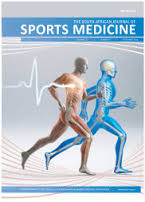Heat shock protein response during fixed intensity and self-paced exercise in the heat in young, healthy women on oral contraceptives compared with young healthy men
DOI:
https://doi.org/10.17159/2078-516X/2022/v34i1a11757Abstract
Background: Heat shock proteins respond to a variety of physiological and environmental stresses, including heat stress, ischemia and endotoxic shock. Hormonal changes during the female menstrual cycle can have a thermogenic effect on body temperature. The monophasic oral contraceptive (OC) pill provides low doses of progesterone and oestrogen over the course of the normal menstrual phase. There is little evidence regarding the combined effects of OC on exercise performance and heat stress with respect to heat shock protein response.
Objectives: This study aimed to determine the response of heat shock proteins (Hsp72) during fixed-intensity and self-paced exercise in the heat in young, healthy women on oral contraceptives compared with young healthy men.
Methods: Sixteen physically active men and women performed 30 min fixed-intensity cycling at 50% of maximum workload, followed by 30 min of a self-paced time trial (TT) interspersed by 30 s maximal sprint at 9, 19 and 29 min respectively. Trials were undertaken in cool (20°C; 48±3% relative humidity (RH)) and warm (32°C; 66±2% RH) ambient conditions. Core (Tc) and skin temperature, heart rate (HR) and subjective responses were measured before, during and post exercise.
Results: The distance, mean and peak power output, mean and peak speed during the self-paced time trial showed no difference between the ambient temperatures for men and women. Hsp72 in females was higher than males at all sample points at both 20°C and 32°C, except for pre-exercise at 20°C (p< 0.04). Women also attained a higher Tc than men at the end of the TT in the heat (38.5°C v 37.9°C for women and men, respectively; p<0.03), higher mean HR and perceived exertion.
Conclusion: This study indicates that females who use oral contraceptives (OC) had higher levels of Hsp72 than males when tested under the same environmental conditions.
Downloads
Downloads
Published
Issue
Section
License
Copyright (c) 2022 South African Journal of Sports Medicine

This work is licensed under a Creative Commons Attribution 4.0 International License.
The South African Journal of Sports Medicine reserves copyright of the material published. The work is licensed under a Creative Commons Attribution 4.0 (CC BY 4.0) International License. Material submitted for publication in the South African Journal of Sports Medicine is accepted provided it has not been published elsewhere. The South African Journal of Sports Medicine does not hold itself responsible for statements made by the authors.
How to Cite
- Abstract 585
- PDF 579






.png)